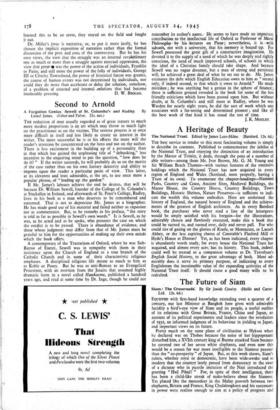The Course of Human %vents
" WHEN in the course of human events it becomes necessary for one people to dissolve the political bands which have connected them
with another ... a decent respect to the opinions of mankind requires that they should declare the causes which impel them to the separa- tion." So begins the Declaration of Independence. And in each generation, in many ways, the American people turns back on its past and contemplates the events, predestined or fortuitous, which led on July 4th, 1776, " the Representative of the United States of America, in General Congress assembled," to declare " that these United Colonies are, and of right ought to be, Free and Independent States." The latest Account of how the course of human events led to this conclusion is a most welcome addition to our not very abundant stock of first-class American historiography. The pub- lishers are to be congratulated on giving us a chance to read and ponder so accomplished a narrative of one of the great events of modem times. For although we may speculate, we cannot in any sense know what form the evolution of British North America would have taken if there had been no separation (a most unlikely hypothesis) or had that separation taken place at a different time or in a different way.
The United States, we know, was born of revolutionary crisis ; it still has the marks of its birth upon it ; and anything that casts light on the modern phenomenon of the American way of life and the American view of political society is most welcome. For even in 1776, the immense possibilities of the infant people were pre- dicted by the numerous class of boosters who if too optimistic about the reproductive powers or willingness of the Americans, yet were hardly optimistic enough about the potentialities of the American way and of American resources. Yet one prophet, here most happily quoted, did hit the nail exactly on the head. And he was not an American, but an .apprehensive Englishman. " One Englishman pointed out that by 1944 Americans, the most powerful people in the world, would visit the ruins of London." What made English- men shudder, made Americans rejoice, and the feeling of being kept in swaddling clothes, of being forcibly kept in a state of 'political infancy, was one of the most powerful irritants that made the Ameri- cans look with more and more suspicion at London, and see in fumbling and dodging the deepest designs on their liberties, their purses and the virtue of their wives and daughters.
Since Dr. Miller makes the most lavish use of the contemporary Press, American and British, it is perhaps in order to suggest that it can be taken too seriously. Even to-day, not all that is printed in the Press is to be taken as meant to be literally true or literally believed, and many an American and many an Englishman must have supped cheerfully enough on the horrors provided for him by vehement publicists from Dr. Johnson and Alexander Hamilton down.
But the greatest novelty and the especial power of this book comes from the determined effort of Dr. Miller to see things through the eyes of the men of the time, who did not know how the story was coming out. He is especially good in putting flesh and blood on the skeletons of propaganda. It is a commonplace that the real or imagined threat of the establishment of an Anglican bishopric in North America, like the legal recognition of Catholicism by the Quebec Act of 1774, greatly stimulated colonial suspicions of the Mother Country. Dr. Miller shows how genuine was the fear of prelacy, of a " mitred " tyrant (the mitre was purely symbolic in the eighteenth century, like the sabre of a modern military dictator). Still more potent was the dread of popery, for it was believed, oddly enough, that the Government of George III, like the Government of Charles I, was carrying on a flirtation, nay, an intrigue with the Whore of Babylon. It is almost a pity that the Gordon Riots came too late to show that the London mob was true blue, and that the worst nightmares of a Hollis were baseless.. Other typical propa- ganda themes were the invincibly seductive arts of the British soldiery, and, on the other hand, the total incapacity of the New Englanders to fight or enjoy themselves except under the influence of rum. Both sides advanced to the conflict all the more cheerfully that they expected the despicable rebels (or tyrants) to run at the first shots. It is much to the credit of both sides that when they learned this to be an error, they stayed on the field and fought it out.
Dr. Miller's forte is narrative, or, to put it more justly, he has chosen the implicit exposition of narration rather than the formal discussion of the pros and cons of the controversy. But he has his own views, the view that the struggle was an internal revolutionary one as much or more than a struggle against external oppression, the view that great.* was the power of the action of individuals, Franklin or Paine, and still more the power of the folly of individuals, George III or Charles Townshend, the power of historical forces was greater, the course of human events was not determined by individuals, nor could they do more than accelerate or delay the solution, somehow, of a problem of external and internal. -relations that had become























 Previous page
Previous page